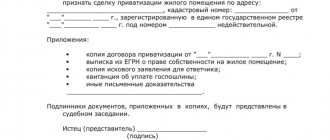What risks does the Buyer face when purchasing an apartment? How to reduce them, or would it be better not to encounter them at all?
We have to immediately disappoint some optimists - no one has ever managed to completely avoid risks in an apartment purchase and sale transaction. This is understandable, because in the primary market there is always a chance that a new building may not be completed . And in the secondary market, the other party to the contract can always challenge the transaction; the law gives it this right. This means there is always a risk . But not every challenge leads to the recognition of the transaction as invalid.
The risk of the Buyer of an apartment is the possible loss or limitation of the property rights that he acquired as a result of the purchase and sale transaction. It is this possibility of losing their right that frightens those who buy housing on the real estate market. But this possibility (or probability) is quite amenable to assessment and control.
To reduce the risks that arise when buying an apartment, you need to at least know . As a maximum, be able to evaluate (or measure).
Knowing the risks means our understanding of what exactly may threaten us in a particular case. Risk assessment means our decision - whether it is worth taking a risk (taking it) or not. And this just depends on our knowledge of these very risks and understanding of how to protect ourselves from them.
It is for these purposes that our STEP-BY-STEP INSTRUCTIONS for Sellers and Buyers of apartments have been developed (an interactive diagram of the instructions will open in a pop-up window).
How do alternative transactions with apartments take place?
What is the procedure there? As for the Seller, he has one concern - how to get money when selling an apartment, and this issue has been resolved for a long time and quite safely in the real estate market (how exactly - see the link). Therefore, all the Seller’s risks when selling an apartment are eliminated only by competent preparation of mutual settlements.
Another thing is the Buyer! The Buyer's risks in a transaction are incomparably higher and more varied, both when purchasing a new building and when purchasing an apartment on the secondary market. So that the ownership right for which the Buyer paid money does not turn out to be limited, canceled, or not formalized at all (as in a new building, for example), he should know the moments in which such a danger exists. These points are described in our INSTRUCTIONS. It also indicates what actions must be taken to eliminate dangerous situations.
Below is a list of typical risks that the Buyer is exposed to when purchasing an apartment on the primary and secondary urban housing markets. This list is not exhaustive, but covers most situations that occur in practice.
Which Sellers are better not to buy an apartment from and why – see this article.
Underestimate the cost of repairs
Apartments without finishing in a new building are much cheaper, so they are often chosen precisely for the sake of saving money. But many buyers do not have a good idea of how much repairs will cost and how long it will take.
Let's calculate how justified such savings are. At PIK, for example, the same two-room apartment with an area of 57.7 square meters without finishing costs 6,462,000 rubles, and with finishing - 7,580,000 rubles. The difference is about 1.1 million rubles. The approximate cost of repair work is 15 thousand rubles per square meter, including rough work. Plus, inexpensive materials will cost an average of 3 thousand rubles per square meter. If you use high quality materials, then it’s worth paying 6 thousand rubles per meter. In our case, high-quality repairs will require 1.2 million rubles, which is already more than we seem to have won. In this case, the work will take several months, which means that the cost of renting housing for this time must also be added to the expenses.
It’s the same story with buying a “grandmother’s version” on the secondary market. It would seem that it would be enough to just re-glue the wallpaper and paint the ceiling. But in reality, you have to level the walls, change the wiring and plumbing. As a result, repairs take several months and cost up to 20% of the cost of the apartment.
How to do it right
Before you buy an apartment, calculate how much repairs will cost you, taking into account the time spent. In most cases, it turns out that it is more profitable to buy a property that is finished or freshly renovated.
Common mistakes made by secondary buyers
All problems that arise after signing a purchase and sale agreement can be divided into five points:
- Pursuit of the lowest cost. The price of an apartment that looks clearly underestimated in relation to the entire real estate market should be a concern in the first place. After all, the main goal of attackers is to implement their fraudulent scheme as quickly as possible.
- Lack of experience and knowledge in the field of real estate transactions.
- Purchase of non-privatized housing.
- Purchasing real estate that previous owners received through inheritance.
- Excessive haste when completing a transaction. The desire to move into the apartment you like as quickly as possible usually works against the buyer, because... You can miss very important nuances when completing a transaction.
They don’t pay attention to redevelopment
The redevelopment itself is not bad. For example, the owners combined a loggia with a room by breaking a wall, or enlarged the bathroom by adding a corridor. And it became more convenient. But if the price of such an apartment is below the market, then most likely the reason is the illegal layout.
Such apartments are not suitable for a mortgage - banks rarely approve loans for them, which narrows the circle of potential buyers. So we have to reduce the price, the discount is on average 10%. If you rent an apartment without using credit, this will not be a problem for you. But keep in mind that in the future, when selling an apartment, you will encounter a similar situation. In addition, the housing inspection may oblige you to return the apartment to its original condition. And you will have to do this at your own expense.
How to do it right
Ask the seller to provide a technical passport from the BTI and compare it with the current floor plan of the apartment. Next, find out whether the redevelopment can be legalized (this information is available on the mos.ru website). If not, then decide whether you are ready for the fact that in the future it will not be easy for you to resell it even at a discount.
Read on the topic: How to coordinate redevelopment in an apartment
Risks associated with the history of the apartment
Any apartment has its own history, and the buyer’s task is to carefully analyze it. There is always the possibility of claims against the object from third parties and challenging the seller’s ownership rights.
To analyze the history of real estate, a set of information is analyzed and compared:
- title documents: purchase and sale agreements, privatization, exchange, etc.;
- documents from the owner: marriage certificate, birth certificate, etc.
- information conveyed by the owner himself during an oral conversation;
- official extracts and documents: an extract on the transfer of rights from the Unified State Register of Real Estate (note that it will contain information only from 1998), a register of powers of attorney, court databases, etc.
- informal information from neighbors, district police officer, etc.
The buyer must request all documents regarding the history of ownership transfer, starting with the first owner. There is an erroneous belief that transactions are subject to verification only within the limitation period and the period for challenging (within 3 years after the conclusion of the contract). But the limitation periods are not always calculated from the moment of signing contracts, more often - from the moment of discovery of a violation of property rights by a third party.
The first thing you need to pay attention to is that the entire chain of transfer of rights is tracked and there are no missing links (long periods when the apartment did not have an owner).
The second is how many times the owner has changed . The fewer transitions of an apartment from the hands of one owner to another, the better and safer it is for the buyer.
Third, on what grounds the apartment was transferred to the new owner. Each type of contract has specific risks. First of all, you should be wary of non-standard methods of transferring rights: by court decision, state act, certificate of inheritance, etc. They should be checked especially carefully.
Fourth - when was the last transfer of ownership . Selling too quickly is often driven by the owner's need for money, but is also a sign of possible fraud. With a short period of ownership, there is a high risk of encountering unpleasant surprises: bankruptcy, challenge by third parties, etc. The longer the owner owns the apartment, the safer it is.
Each link in the “chain” must comply with the law and not violate the rights of third parties.
What risks of transfer of ownership exist depending on the type of transaction?
Contract of sale
Common Risks
- the contract was not fulfilled/improperly performed;
- the rights of spouses were violated during the alienation of an object;
- the seller did not give an account of his actions.
What documents to request
- contract of sale;
- payment documents for it;
- the spouse's consent to the transaction.
Donation agreement
Common Risks
- the donor could not direct his actions (was incompetent);
- the donation was a sham transaction (it covered up the apartment’s contractual agreement)*;
- should alert you if the apartment was donated by an elderly person who soon died (the heirs may try to challenge the donation).
*This scheme is often used in order not to comply with the rule on the priority right of neighbors to a share in real estate or to avoid the emergence of joint ownership of the property with a spouse.
The spouse and neighbor may challenge the sham transaction to protect their property interests. What documents to request
- gift agreement;
- marriage/divorce certificate;
- consent of the spouse to complete the transaction. and
Annuity and life agreement with dependents
Common Risks
the contract has not been fulfilled/it is impossible to verify its fulfillment;
the owner did not understand what kind of contract he was signing.
What documents to request
- annuity agreement;
- documents confirming the fulfillment of obligations;
- a document confirming the occurrence of circumstances causing the transfer of ownership.
Barter agreement
Common Risks
- the contract was not fulfilled/improperly performed;
- the rights of the spouses were violated during the alienation of the property;
- the seller did not give an account of his actions;
- the risk of problems arising in another exchanged apartment and, as a consequence, termination of the exchange agreement.
What documents to request
- barter agreement;
- a document confirming the transfer of rights under it (extract from the Unified State Register or other).
Privatization
Common Risks
- the most common risk is violation of the rights of minors during privatization (discharged, not included as owners, etc.);
- there was “deprivatization” in the history of the apartment;
- the risks that residents were not accountable for their actions when they refused privatization.
What documents to request
- social lease agreement/order;
- decision from the authorities on the provision of housing;
- agreement on transfer of ownership;
- decision to transfer the apartment into private ownership.
Inheritance
Common Risks
- the emergence of new heirs who missed the deadline for entering into inheritance and declared their rights;
- contesting a will;
- obligatory share in the inheritance (heirs who have the right to inherit contrary to the will);
- actual acceptance of the inheritance (those heirs who did not submit an application to the notary);
- notarial errors (incorrectly executed certificate).
What documents to request
- certificate of right to inheritance; agreement on division of inheritance;
- documents for other relatives.
Buying an apartment in a new building or housing cooperative
Common Risks
- the rights of former spouses to the object may be preserved (the spouses could divorce from the start of construction until the delivery of the object);
- incorrect conversion of shares into square meters.
What documents to request
- participation agreement in housing cooperatives;
- housing cooperative charter;
- extract from the minutes of the general meeting of members of the housing cooperative;
- certificate of full payment of the share;
- agreement for participation in shared construction, a document confirming payment under the shared construction agreement.
Maternal capital
Common Risks
Risks arise if the maternity capital was used to pay off the mortgage loan, but the children were not initially included in the policy.
In this case, parents write obligations to the Pension Fund about allocating a share to their children after the bank’s mortgage pledge is removed. But the Pension Fund has virtually no control over the implementation of this condition. Children may later challenge the deal as their rights have been violated. Both the ownership and the size of the share can potentially be challenged.
Failure to allocate a share to children may serve as grounds for declaring the transaction invalid at the request of the Pension Fund.
What documents to request
children's birth certificates
Court decision
Common Risks
- the risk of appeal and review due to newly discovered circumstances;
- often counterfeited.
What documents to request
- the court's decision;
- grounds for the claim.
Of course, we should not forget about fraud schemes, forgery, forgery of documents, etc.
As a result of such an analysis, complete information about the object is revealed: if the risks can be minimized, then you can begin preparing documents; if not, then you should refuse the purchase.
Do not ask the seller for a certificate of mental health
A certificate from a psychoneurological dispensary (PND) is not included in the package of mandatory documents on the part of the seller, however, experienced realtors always recommend asking for it. Why is this necessary? The certificate confirms that the seller is legally competent and is accountable for his actions. If this is not so, then his relatives will be able to challenge the deal in court. In this case, you will have to return the apartment, but the process of returning the money may take longer.
How to do it right
Unfortunately, you cannot oblige the apartment seller to provide you with a certificate from the IPA. However, if a person has nothing to hide, then he will easily meet you halfway. To do this, he just needs to apply with a passport to the state psychoneurological dispensary at his place of residence. The certificate is issued free of charge. If the apartment has several owners, it is worth obtaining certificates from each of them.
If the seller categorically refuses to provide a certificate from the PND, citing, for example, his employment, then it is better not to risk it and look for another apartment.
Summary
The main risk of an apartment buyer is that he may lose the ownership rights that were transferred to him in the transaction. But this risk is completely controllable.
So, here is the minimum that a buyer needs to check to make sure the transaction is safe:
- The seller has the right of ownership, duly registered.
- The absence of encumbrances and seizure of the object in the extract from the Unified State Register of Real Estate.
- The absence of other prohibitions on the transaction or other barriers that make it impossible.
- There are no missing links or high-risk transactions in the apartment’s history.
- The financial condition of the seller and the risks of bankruptcy.
- Adequacy of the seller, her legal capacity.
- Possibility of obtaining all necessary approvals for the transaction (from a spouse, guardian, etc.).
- Validity of the seller's power of attorney.
- Absence of residents who have the right of indefinite residence.
- Availability of essential terms in the contract.
- Correct preparation of a set of documents when submitting for registration.
They do not check the rights of other persons registered in the apartment
Before buying, you must check the apartment for cleanliness - find out who, besides the seller, is registered in it and what rights these people have. It may turn out that there are several owners, which means that when purchasing you need permission from each of them. Otherwise, it may happen that you pay money to one person, and the second owner, through the court, will oblige you to return the property to him.
In addition, if the apartment was privatized and other members of the seller’s family refused privatization in his favor, then they still retain the right to use the residential premises. And, unfortunately, there are cases when these relatives through the court prove their right to move into the apartment.
How to do it right
Request from the owner an extract from the house register or a single housing document that indicates all the people registered in the apartment. If it contains minor children, make sure that the seller has permission from the guardianship authorities for the sale.
Then find out whether the apartment has been privatized - this can be done with the help of a competent lawyer. If yes, then ask the owner’s family members for notarized waivers of claims to live in this apartment.
Risks of non-registration of a transaction
Finally, at the final stage, problems may also await the parties: the contract is signed, but when registering the transfer of ownership in Rosreestr, a refusal is received.
How to minimize this risk? ❗It is necessary to ensure that all conditions for completing the transaction have been met:
- The agreement is notarized (if required by the Civil Code), the content of the agreement complies with the law and it contains all the essential conditions.
- The documents are complete. There is consent to the transaction from the guardianship authorities and the spouse, etc.
- The application for transfer of ownership is filled out correctly and contains no errors.
- The entry in the Unified State Register of Real Estate at the time of transfer of documents meets all basic conditions (is there no arrest, lien, prohibition from the owners to act by proxy, objections from the previous owner).
When receiving the documents, all that remains is to check that there are no errors in the extract from the Unified State Register and whether the new owner is indicated correctly. That's all.
They don't check their neighbors
Many are unhappy with their neighbors, and some are even ready to change their apartment because of them. Of course, if the seller has rowdy neighbors, he will try to hide it. For example, he will schedule viewing for the time of day when they are at work.
How to do it right
Ask the seller to schedule a viewing in the evening, after 18:00, when many people return from work - this way you will see who lives in this house. In addition, you will immediately understand whether noisy young people are gathering under the windows or on the staircases.
Look at the condition of the windows and balconies of neighboring apartments. Pay attention to the common areas: how clean the elevators are, and whether there are any writings on the walls. If the entrance is clean and there are pots of flowers, then the risks are much lower.
You can try to get to know your neighbors personally by ringing the doorbell and talking with each for a few minutes. It’s worth talking to the concierge; usually they are happy to talk about the residents of the house. You can also ask for the contact information of the person in charge of the house, he will also give the necessary information.
Help from specialists
You can contact specialists from the very beginning, if you have no experience in buying apartments, so that they complete the transaction completely, or at any stage at which you have difficulties. By choosing a reliable company and qualified realtors, you will be able to save a lot of time, and maybe also buy a home cheaper.
This does not mean that in all cases it is more profitable to turn to professional intermediaries. Firstly, companies of different levels operate on the market and, if you do not pay due attention to the choice, you can then greatly regret it. Secondly, if you already have experience in this, and you yourself understand well what needs to be done, you may be able to conduct a transaction no less, or even more effectively, than with realtors. Therefore, ultimately the choice remains with the buyer.
They don’t read reviews about the management company
The management company directly influences the quality of life of residents: it is the one who creates a cleaning schedule for common areas, carries out repairs and sets tariffs for utilities (garbage removal, building repairs, security, concierge services). And sometimes it may turn out that the cost of service is high, although in fact the management system works poorly.
How to do it right
Before buying an apartment, read the forums and groups of the building or area on social networks. For example, in many new buildings there are chat rooms for residents, and on Facebook you can find groups by area - where you can easily find neighbors and ask them about problems in maintaining the house.
Legal advice when buying an apartment on the secondary market
Advice from a lawyer will help you minimize the risks when buying an apartment and get your benefits from the deal.
Apartment purchase insurance
To protect the buyer of an apartment from loss of his right, there is title insurance. This type of insurance involves compensation for the market value of an apartment if the buyer has lost the right to it through no fault of his own.
Insurance payments can be received in the event of risks arising that lead to the recognition of the transaction as invalid:
- entering into a transaction with a person who did not understand the significance of his actions;
- the transaction was concluded without the consent of the spouse;
- as a result of the transaction, the rights of a minor were violated;
- sale of housing as a result of fraud or coercion.
A title insurance contract can be concluded for a period of one to 10 years, taking into account the individual characteristics of the transaction.
Receiving a tax deduction
A citizen’s right to receive a tax deduction when purchasing an apartment is regulated by Article 220 of the Tax Code of the Russian Federation.
The following may apply to receive it:
- an officially employed citizen from whose salary income tax is withheld;
- a non-working pensioner, subject to 3 years of continuous work experience and payment of tax;
- a citizen who acquired property in the name of a minor child.
The possibility of obtaining a tax deduction after purchasing an apartment is not limited by time.
The maximum amount of expenses for the purchase of an apartment from which the deduction will be calculated is 2 million rubles. and will amount to 260 thousand rubles. When purchasing an apartment with a mortgage, the deduction is calculated from the amount of 3 million rubles. and will be equal to 360 thousand rubles. plus 13% interest on the interest paid under the loan agreement.
In one year, you can only reimburse the amount that was withheld as income tax from your salary. It may take several years to receive the entire deduction amount to which a citizen is entitled.
To receive a tax deduction, you must provide the following documents:
- identification document;
- certificate from place of employment in form 2-NDFL;
- application and declaration in form 3-NDFL;
- a document confirming the purchase of an apartment;
- documents confirming the costs incurred for the purchase of an apartment, payment of interest on a mortgage loan;
- marriage certificate (when purchasing an apartment in joint ownership).
You can receive a deduction by directly contacting the Federal Tax Service or through your employer. On average it takes from 2 to 4 months to receive it.
They do not check for debts for utilities and major repairs.
The debt for major repairs is assigned to the apartment, which means it goes to the new owner. By purchasing such an apartment, you agree to this by default.
But debts for paying utility bills remain with the previous owner. However, if they are very large, then there is a risk that the seller will declare bankruptcy. In this case, within three years after the sale of the apartment, the transaction may be declared invalid. And then you will be obliged to return the apartment to the bankruptcy estate, but getting the money back will be very difficult - you will become one of the creditors of the bankrupt seller.
How to do it right
To find out if there are any debts on the apartment, ask the seller to provide a certificate from the management company about the absence of debts for housing and communal services.
If you find out that there is a large debt behind the apartment, be sure to discuss this with the seller. A good option is to pay the bills yourself and reduce the cost of the transaction by this amount (for example, if an apartment costs 10 million rubles, and the debts are 100 thousand, then you will put 9.9 million in a safe deposit box). It is important to close the debt before the transaction.
✍️ Possibility of signing documents by a minor child
According to the law, citizens under the age of 18 are divided into two main groups:
- minors, up to 14 years old (Article No. 28 of the Civil Code of the Russian Federation);
- minors, from 14 to 18 years old (Article No. 26 of the Civil Code of the Russian Federation).
The first group of children cannot conclude transactions on their own and sign documents. Their legal representatives (parents, guardians) have this right.
The second group has the right to make transactions and sign independently with the written permission of their representatives.
We can distinguish another category of citizens who have not reached the age of majority - from 16-18 years old. At this age, a person can be declared fully capable (emancipation) by decision of the guardianship authorities, with the consent of the parents or by a court decision.
In this case, the citizen is responsible for his actions and can make transactions on his own behalf, as well as sign without anyone’s consent.










